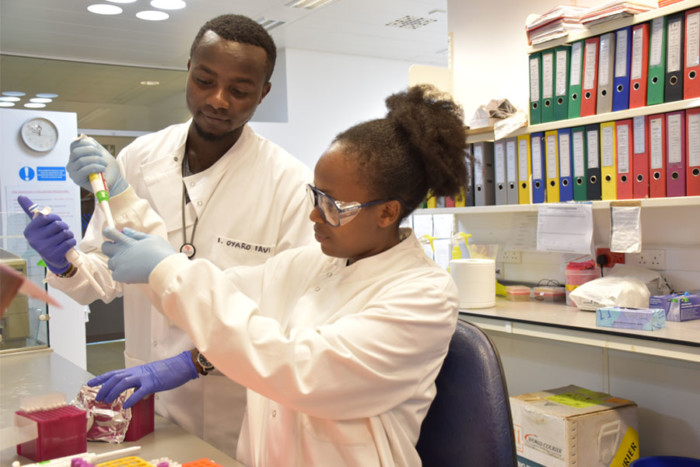According to the World Health Organization, 50 million people worldwide have epilepsy.
In a 2021 publication on the National Library of Medicine titled ‘Prevalence and mortality of epilepsies with convulsive and non-convulsive seizures in Kilifi, Kenya’, out of the 4,441 people in Kilifi who participated in the study,141 had lifetime epilepsy and 96 active epilepsy.
Below is an excerpt with Epilepsy specialist at Kenya Medical Research Institute (KEMRI) Wellcome Trust Dr.Gilbert Katana and Baraka FM on the ‘Jukwaa la Utafiti’.
So, what is Epilepsy?
Epilepsy is a neurological condition that causes unprovoked or recurrent seizures.
“If you get more than one seizure in less than 24 hours without having a high fever, severe flu or infection/disease such as Meningitis or Cerebral Malaria then it is epilepsy. We have to conduct tests to identify what is causing the seizures,” said Dr Gilbert Katana.
People with epilepsy tend to have more physical injuries (such as fractures and bruising from injuries related to seizures), as well as higher rates of psychological conditions, including anxiety and depression.
Dr. Katana explains that “there is a great connection between mental health and epilepsy in terms of the patients, caretakers, and caregivers; and in terms of what people with epilepsy go through in the society on a day-to-day basis.”
Causes of Epilepsy
Epilepsy is not contagious and one can get epilepsy at any given age.
Causes can vary from structural, genetic, infectious, metabolic, and immune; some are unknown.
Brain damage from prenatal and perinatal causes e.g. loss of oxygen or trauma during birth which may arise in prolonged labour.
A child may also be born with brain complications if the mother fails to get enough minerals needed for the formation of the brain during pregnancy.
According to Dr. Katana, there are different causes and types of epilepsy.
Neurological complications may arise from diseases such as swelling in the brain i.e. brain tumors; some are caused by strokes that may arise from conditions such as blood pressure.
“High blood pressure may cause a burst in the brain which in turn may result in bleeding in the brain hence causing brain complications,” said Dr. Katana.
One can get epilepsy at any age given as there are several causes for the disease.
“When a person is involved in an accident that causes injury to the brain, for example, a road accident or even an attack, then they are at a higher risk of getting epilepsy,” said the doctor.
Some health conditions like stroke and diabetes may also lead to epilepsy.
“Genetic conditions may also lead to epilepsy. There are also other factors like malformation of the brain, conditions like hydrocephalus,” he added.
So, what are the signs and symptoms of epilepsy?
“There are different signs of epilepsy because there are also different types of epilepsy,” said Dr. Katana.
There is a type where someone just spaces out while in the middle of a conversation.
“While in a conversation, the person may suddenly go quiet and then lose consciousness for a while,” said Dr.Katana
In some instances, a person having a seizure may violently flail their arms and legs and even foam in the mouth. Some patients may experience mental breakdowns and start running and later lose consciousness and fall.
“When these happen, then tests should be carried out to establish the cause of the above symptoms, it can be epilepsy or something else,” said Dr. Katana.
According to the World Health Organization, the risk of premature death in people with epilepsy is up to three times higher than in the general population, with the highest rates of premature mortality found in low- and middle-income countries.
“A great proportion of the causes of death related to epilepsy, especially in low- and middle-income countries, are potentially preventable such as falls, drowning, burns, and prolonged seizures,” said WHO.
Types of seizures
There are convulsive and non-convulsive seizures.
A seizure can vary from the briefest lapses of attention or muscle jerks to severe and prolonged convulsions.
“Some soil themselves when experiencing a seizure, and others experience involuntary hand and leg movement that they cannot control. Some become weak and unaware of their environment while others become confused,” said the Doctor.
Seizures can also vary in frequency.
How to help someone having a seizure

When assisting someone experiencing a seizure, you should not panic.
“If there are things that may harm the patient around, remove them because they are not aware of their surrounding,” said the medic.
You should also loosen their clothing, for example, if they had a tie on remove it, you can also unbutton their shirts and take off their necklaces and other things that may harm them.
Dr. Katana also says the helper should allow the patient to go through with the seizure and when they have started to calm down, make them lie on their side.
Do not allow anyone to place anything in the person’s mouth.
“Sometimes it may seem that they are biting their lips or are foaming or bleeding through the mouth, you should not put anything in their mouth because, during seizures, people are always stronger than usual so they risk harming themselves or even choking,” said Dr. Katana.
If the seizure lasts more than five minutes, Dr. Katana advises the one assisting to immediately seek help from the nearest health center as prolonged seizures cause more damage to the brain.
Treatment of Epilepsy
“When treating epilepsy, we consider the factors that led to the seizures,” said Dr. Katana.
In childhood epilepsy, some children outgrow the disease if they receive treatment.
If the cause of the seizure is a brain tumor, then the affected person has to undergo brain surgery to remove the tumor.
“In some cases of seizures, there are drugs administered. If one goes for more than five years without experiencing a seizure then the person is said to be cured. However, if the person comes across the factors that led to the seizures, then he/she is advised to seek help,” said the epilepsy doctor.
Prevention of Epilepsy
Even though some cases of epilepsy are genetic and some are unknown, others are possible to prevent.
According to WHO, preventing head injury is the most effective way to prevent post-traumatic epilepsy.
Adequate perinatal care (period during pregnancy and after giving birth)can reduce new cases of epilepsy caused by birth injury. Pregnant women should also have food with enough minerals for brain formation during pregnancy.
The use of drugs and other methods to lower the body temperature of a feverish child can reduce the chance of febrile seizures.
Taking measures to prevent or control high blood pressure, diabetes, and obesity; and avoidance of tobacco and excessive alcohol use will help prevent epilepsy associated with stroke.
What should society do to support epilepsy patients?
During the show, Dr. Katana said that society should stop the stigma against those suffering from epilepsy.
“Some people suffering from epilepsy are shunned due to their actions during an epileptic attack, for example, soiling themselves, foaming in their mouths,” he said.
“Shunning such people may lead to them having low self-esteem/self-confidence no matter their level of education or abilities. The person feels intimidated or ashamed due to the way the society views them,” he added.
Those suffering from the disease should also be supported. Society should ensure they receive education and are treated or get the required treatment.
“We see situations where children suffering from epilepsy are sent back home from school when they experience a seizure with an excuse of them frightening/ scaring other learners due to the belief that the seizures are caused by demonic reasons,” said the doctor.
At Kilifi Referral Hospital, KEMRI Wellcome Trust, in the neuroscience division, there is an epilepsy clinic where all those suffering from epilepsy or are suspected to suffer from epilepsy are taken care of.
“We assess them; carry out tests to ensure they get the right treatment. We also do follow-ups, we will not treat you today and then leave you like that,” said Dr. Katana.

In the same program, there is also a mental health clinic where there is a partnership between the hospital and KEMRI and there are different programs to ensure those who are suffering from mental illnesses can get more information and treatment.
“They get treatment in health facilities near them and if further tests or treatment are needed then they are referred to the County hospital,” said Dr.Katana.
“We are on track to ensure that mental illnesses are treated and sensitization regarding mental illnesses is carried out. If people have enough correct information regarding mental illnesses then it will help in the containment of the disease,” he added.
******
“Jukwaa la Utafiti” is a radio Research Platform by KEMRI Wellcome Trust on Baraka FM. The show airs every Thursday from 8-9 pm.
This is the second part of the third phase of the program which tackles health issues in society.
The health show which was piloted in 2016, aims to stimulate dialogue on medical research topics.
The show allows researchers to interact with listeners or members of the public and clarify different health and research misconceptions while at the same time sensitizing the public on different medical issues.
Listeners participate by sending questions before and during the show. Questions can be sent via Baraka FM social media platforms or SMS number.













